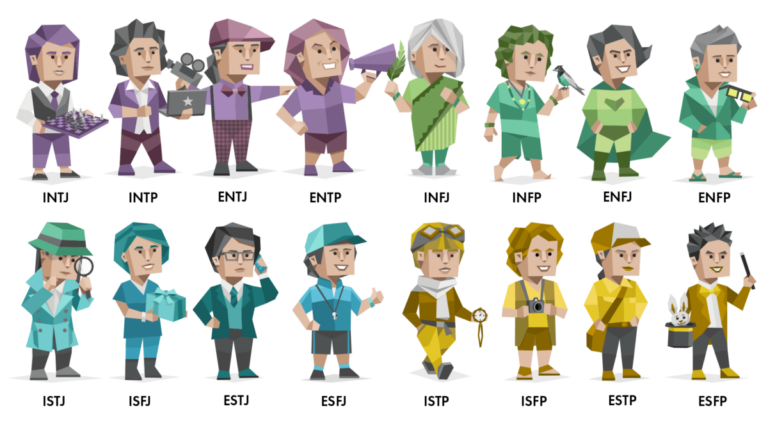The Myers-Briggs Type Indicator (MBTI) is a popular tool that helps people understand various aspects of their personality. One of the 16 types identified in the MBTI is ENFP, which stands for Extroverted (E), Intuitive (N), Feeling (F), Perceiving (P).
They strive for harmony and find satisfaction in helping others. Their energy is contagious, and their ability to motivate others makes them excellent leaders.
However, ENFPs may struggle with overwhelm due to the desire to do too much at once. They may also find it difficult to finish what they start due to the constant desire for newness.
Understanding your MBTI personality type can help you develop yourself and improve your interactions with others. If you identify as an ENFP, use your natural inclination to innovate to achieve your goals and create positive change around you.
Ultimately, each personality type has unique qualities and potential for growth; The key is to be aware of your characteristics and work on them.
Characteristic personality traits of ENFP
- Extravertism for ENFPs means energetically interacting with the world around them. They make friends easily and strive for harmony in relationships with other people.
- Intuition is manifested in the ability to see hidden opportunities. ENFPs are imaginative and prefer to do things that require an innovative approach.
- Feeling, as a trait characteristic of ENFP, describes warmth and emotional openness. They are able to deeply empathize with others and always strive to help.
- Finally, ENFPs’ perceptiveness allows them to be adaptive and willing to change. They are not afraid of risks and love a variety of life experiences.
ENFPs value freedom of expression and independence. Their natural curiosity makes them constantly learn something new. Even though they can be unpredictable, this makes the ENFP personality especially attractive to others.
It is important to remember that each person is unique, so not all representatives of the type can display the listed traits equally clearly. However, understanding these core characteristics can help to better understand the personality structure of the ENFP type.
Strengths and talents of ENFP people

Creativity is a fundamental element of the ENFP personality. They see the world through the lens of possibility, which allows them to approach problems outside the box. Their ability to generate original ideas often leads to innovative solutions in a variety of fields.
The ENFP’s motivational abilities also deserve special attention. They know how to inspire others with their enthusiasm and optimism. Thanks to their natural charisma, ENFPs easily connect with different people, helping them realize their potential.
ENFPs often become the life of the party or project leaders due to their unique combination of energy, openness to new experiences and willingness to share the light of their talent with others.
So, if you are an ENFP or work with someone who is, remember the value of these special abilities – they can benefit both your individual life and all the projects you work on as a team.
Difficulties and challenges that ENFPs face in everyday life and in the professional sphere
In everyday life, ENFPs often struggle with organization and priorities. Their desire for flexibility may conflict with their need to follow a routine. In addition, they may quickly lose interest in current tasks if something more exciting comes along.
At work, ENFPs sometimes encounter misunderstandings from colleagues or superiors due to their unconventional thinking. Their tendency to innovate and experiment can be mistakenly perceived as fickleness or reluctance to engage in routine.
One of the main professional challenges for ENFPs is finding a balance between freedom of expression and fulfillment of responsibilities. To successfully resolve this conflict, they often need the support of understanding management or a team of like-minded people.
ENFPs may also have difficulty completing projects. Their enthusiasm at the initial stage often fades as they approach the detailed elaboration of the task.
To overcome these challenges, ENFPs need to develop time management systems that allow them to remain productive without losing interest. Strategies for maintaining focus on tasks until completion are also helpful.
So, despite all the challenges, ENFPs are able to achieve outstanding results due to their optimism and willingness to see opportunities where others see only obstacles.
The importance of understanding your personality type for personal growth and improving interpersonal relationships
Understanding your own personality type plays a key role in self-development and strengthening relationships with others. When we know our strengths, weaknesses and preferences, we can build more effective strategies for achieving goals and conflict resolution.
Personality type affects how we perceive the world, make decisions, and interact with other people. Having understood this, you can learn to approach each person individually, taking into account his characteristics. This improves the quality of communication and promotes deeper understanding between people.
In addition, self-knowledge through personality type analysis helps determine professional direction and social niche. A person begins to better understand his role in the team, which contributes to the development of teamwork.
This aspect is no less important when looking for a life partner or friends – knowing the main character traits, you can strive for more harmonious relationships.












